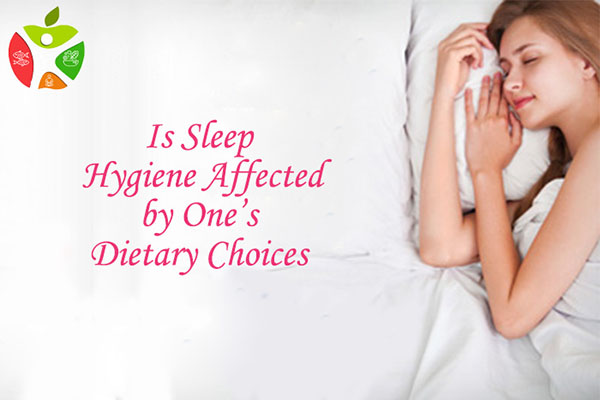Is Sleep Hygiene Affected by One’s Dietary Choices
These days due to increased work pressure, long hours of work and exposure to artificial lights, travel related and other stress can cause problems and may affect sleep quality. The best way to get a good night’s sleep is to practice good sleep hygiene (sets of practices, habits, and environmental influences that impact one’s health). One of the most important yet very often overlooked sleep hygiene practice which improves the quality of sleep(life) is making right dietary choices.
Serotonin and melatonin are two hormones that are sleep-promoting hormones. These are produced from tryptophan a branched chain amino acid. Certain foods and lifestyle patterns promote the production of these hormones and some disrupt their production or proper utilisation.
Melatonin is synthesized and secreted by the pineal gland and has the ability to modify body’s rhythms and has an important effect on the reproductive system. Melatonin is synthesized from its precursor, serotonin which itself is a neurotransmitter, which in turn is derived from a branched chain amino acid, tryptophan. Both serotonin and melatonin have an effect on and regulate appetite, mood and sleep.
Serotonin and melatonin are almost literally day and night in hormonal terms. They perform opposite jobs and yet they must work in harmony to keep the body balanced. Serotonin can be described as our body’s natural happiness drug. It is a feel-good hormone and promotes positivity and relaxation. It makes one feel energized and is synthesized during daylight hours. Whereas the synthesis and secretion of melatonin is affected by exposure of eyes to darkness. Serum concentrations of melatonin are low during the daylight hours and increases during the dark hours of the night. Melatonin makes the body lethargic and winds it down to a sleep ready state.
Many nutrients found naturally in food aid in promoting the production of melatonin and thus aid in promoting sleep. These are tryptophan, magnesium, calcium and vitamin B6. Also eating certain foods at certain times can help in improving the quality of sleep.
Foods that have high tryptophan levels and therefore, induce feeling of sluggishness and sleep are:
- kidney beans,
- peas,
- beans,
- cashews,
- walnuts,
- almonds,
- sunflower seeds,
- sesame,
- dairy products
Foods, which aid in the production of serotonin and melatonin from tryptophan are those rich in minerals like calcium and magnesium, are:
- dark green leafy vegetables,
- nuts and oil seeds- especially walnut and almonds,
- soybean,
- yogurt,
- cheese,
- banana,
- fish and
- meat.
These also deactivate the production of adrenaline. Adrenaline is the hormone that increases activity level and is responsible for body’s fight or flight response.
Dairy products such as yoghurt and milk, contain both tryptophan and calcium, that is why hot milk is preferred so much in many indian families before bed.
A deficiency of Vitamin B6 is linked with poor sleep and symptoms of depression and mood disorders which may lead to insomnia. Vitamins B6 rich foods which mediate the conversion of tryptophan to melatonin are:
- sunflower seeds
- pistachio nuts
- flaxseeds
- banana
- dries prunes
- cherries,
- lemon,
- tomatoes, and
The key, therefore, to a good night’s sleep is to boost the production of melatonin by improving sleep hygiene. One way is to improve nutrition and include the above-mentioned foods in your daily diet. Certain other tips that would be helpful are:
- Reduce intake of caffeine rich foods, particularly during bed time, such as tea, coffee, energy drinks, carbonated beverages, etc.
- Reducing alcohol intake, as it interrupts with the restful, deepest REM sleep cycle.
- Exercise regularly but not too close to sleep time
- Eat food at least two hours before daily sleep time.
- Avoid eating heavy meals before bed time, even containing the recommended foods. Moderation is the key to good health.
- Spicy foods are best avoided just before bed as they may cause heartburn and acid reflux, disturbing normal sleep
Also avoid too much of electromagnetic radiations and artificial lights in the bed room to ensure proper sleep. This is because, melatonin production is increased in the darkness.
Contact: Best Nutritionist Near Me

